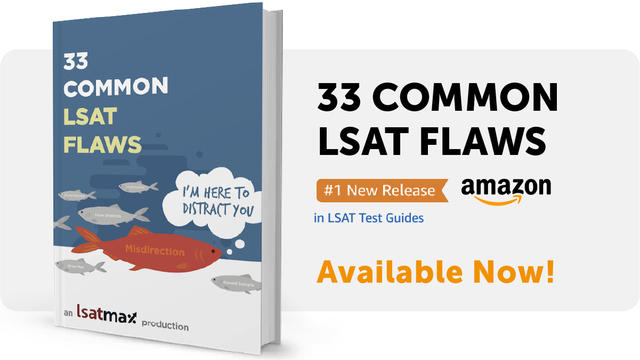Though in the real world,i.e. the not LSAT Prep world, we usually negate something by saying it's opposite (hot/cold, good/bad, new/old, etc.), in our newly-founded logic-minded LSAT prep world we have a different way of negating (i.e. the logical opposite). There are three categories of statements that we negate on the LSAT: quantifiers, sufficient/necessary statements and, for lack of a better term, "regular" statements.
We've discussed quantifiers before. We have the "some" statements and the "most" statements. Any quantifier word that means "at least one" falls under "some" statements. Any quantifier word that means "more than half" falls under "most" statements. How would we negate a "some" and a "most" statement? Well if "some" means "at least one," the logical opposite will be "none." Therefore, the negation of "some" is "none." Now, let's look at "most" statements. The logical opposite of "more than half" is "less than or equal to half." Therefore, the negation of "most" is "50% or less."
You might be wondering, what about "all" statements? Well that falls into the sufficient/necessary category. Take for example:
All berries are red.
You would then write that as:
If it is a berry, then it is red.
Now, to make the contrapositive you'll have to negate and then reverse. What would the contrapositive look like?
If it's not red, then it's not a berry.
Easy as pie. But how would you negate this general principle (i.e. what is the minimum required to disprove this statement)? If you are thinking about blueberries, good for you! Now let's discuss how the existence of a blueberry negates this general principle.
A blueberry is a berry, but it is not red. This contradicts our general principle because according to the principle: if berry, then red. So you would negate a general principle by showing that the sufficient condition can exist without the existence of the necessary condition.
Another way to think about this is that the logical opposite of "all" is "not all." Therefore, you would negate the statement "all berries are red" by saying "not all berries are red," which is exactly what the existence of a single blueberry proves.
Alright, the last set of statements is the regular statements. These are sentences that are not sufficient/necessary and do not have quantifiers. Take for example:
This coffee is hot.
What is the negation of the above sentence?
This coffee is not necessarily hot.
Notice that the correct negation is not that the coffee is cold. Rather stating that anything that is "not hot" is the logical opposite of hot (i.e. the minimum required to disprove that the coffee is hot). The coffee being lukewarm, warm, cold, freezing or even room temperature would all negate the original sentence.
Learning how to properly negate is very important on the LSAT test. I'll make sure to make another post on practicing these negation techniques with you. For now, try negating the statements you read in your head, and keep prepping!
Happy Studying!












